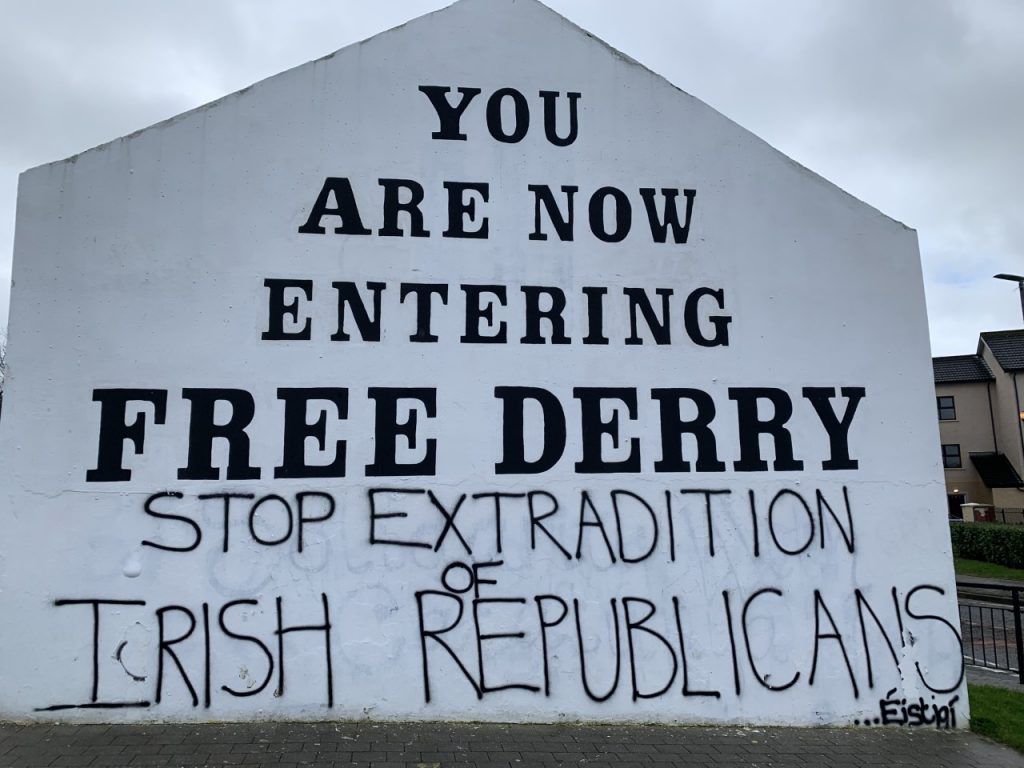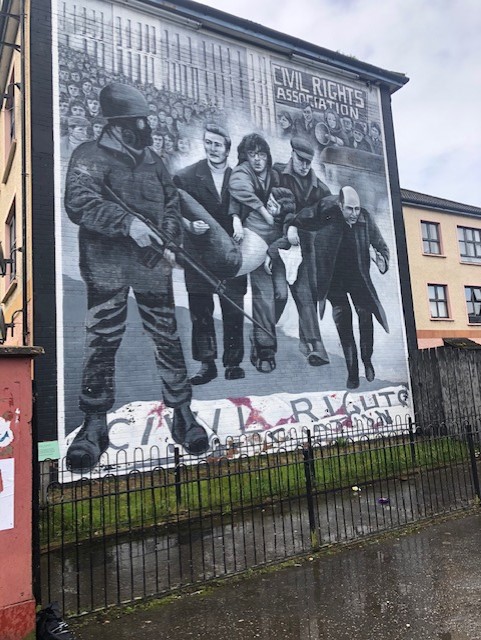On Tuesday morning of our trip (after a full day in Belfast), we hopped on the bus and headed to Derry… or Londonderry, depending with whom you are talking. (And for a very funny take on the situation in Derry during the Troubles, see Derry Girls.) From the name(s) themselves, it was clear that this was going to be a very divided experience, as Katie Tompson noted “what I was not entirely ready for was the intense emotions and remaining political turmoil that poured out of the city.”
She recalled, “walking down the street, we noticed that some curbs were painted red white and blue, which seemed… aggressive almost. However, as we crossed into the Bogside, it became very clear why part of the community needed to display their unionist pride.
(Note the painted curbs above and also that “west bank” refers the west bank of the river in Derry.)
After touring the old part of the city and enjoying the view, we walked down into the newer part of the city.
As we walked down the hill, the seemingly hurricane-force winds that destroyed our hair as well as a number of umbrellas, it seemed almost fitting considering the intensity of what was to come. Maggie Crawford noted, “at first, I was just excited to be in Derry so that I could imagine what it was like to be in an episode of Derry Girls, and that’s really what it felt like as we approached the iconic “You Are Now Entering Free Derry” sign.
Aside from the “You are now entering Free Derry” sign that immediately struck you, there were many huge murals depicting the civil rights movement that took place, as well as the violence that came from these movements.”
A poignant moment for many on the trip was the visit to the Free Derry Museum. The Free Derry Museum documents the events that unfolded on “Bloody Sunday.” Tompson noted “we had talked about Bloody Sunday a little bit, but going through the museum, only yards from where the violence actually occurred, really hit me in a way I hadn’t expected. It had happened so recently in history, and so close to where we were, in a museum run by a man that was there. It was so real and current all of a sudden. Especially after realizing that the official truth, that the 13 killed were, in fact, victims, and not perpetrators in any way, was only established 10 years ago on June 15, 2010. Crawford recalled, “At one point in the museum there was a placard that told the tale of a young toddler who was the victim of a British Army officer who took his envoy vehicle and smashed the toddler in its stroller into a building.”
For many, the most impactful part of the experience, came when listening to a young man named Ross, whose grandfather was one of the victims of Bloody Sunday, and who had multiple other family members die during the Troubles. He detailed to the group the ways in which the time affected his family. “It was astonishing to see how intensely it affected Ross and listening to how angry he was about the wrong that had been done to his family and his community, even though he hadn’t even been alive when everything happened. It was in that interaction that I really started to understand how much the Troubles still permeates through communities, because they pass it on to the next generations.” Katie added.



 Earlier this week, Marquette University announced that
Earlier this week, Marquette University announced that 